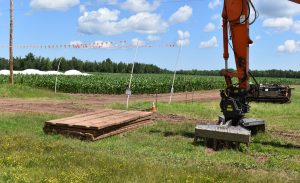Energy Policy
WGF analyses and statements on energy policy in Wisconsin, including generation, distribution, energy sources, and efficiencies. This work is developed by the Energy Policy Work Group, and is closely allied with our Climate Change work.
Guest Blog: Net Metering and Wisconsin’s Clean Energy Future
The following blog post was written by Mark Asplund, a member of Wisconsin’s Green Fire’s Energy and Climate Change Work Group. Here, Mark describes two proposals currently under consideration by the Wisconsin Public Service Commission affecting net metering – a utility billing policy that supports customers with self-generating electricity sources like rooftop solar panels.
You can …
Read More >WGF Hosts Wisconsin’s Clean Energy Plan: Opportunities for WGF Impact Webinar
On May 12, 2022, Wisconsin’s Green Fire hosted a webinar with WGF Energy Work Group member Keith Reopelle, moderated by Energy Work Group co-chair Gary Radloff. In this 75-minute webinar, Keith discussed Wisconsin’s first clean energy plan (CEP). The CEP, released on April 20, 2022, puts Wisconsin on the path to 100 …
Read More >Wisconsin’s Green Fire Encourages Members to Participate in Wisconsin’s Energy Democracy Process
This blog post provides background information on parallel energy generation purchase rates. We encourage WGF members to submit comments to the Public Service Commission of Wisconsin on the Alliant Energy parallel energy generation case by Friday April 29th, and stay tuned to our website for updates on further opportunities for public comments …
Read More >WGF Comments on Enbridge Line 5 Re-Route draft Environmental Impact Statement
WGF 2022 Comments on Draft Environmental Impact Statement
In December 2021, the Wisconsin Department of Natural Resources (WDNR) released the draft Environmental Impact Statement (EIS) for the Enbridge Line 5 crude oil pipeline re-route in northern Wisconsin. Wisconsin’s Green Fire testified at the public hearing on February 2, 2022 and submitted Read More >
Public Engagement Encouraged as Wisconsin Charts its Energy Future
The first public comment opportunity is the PSC “Roadmap to Zero Carbon” is happening now. The docket will evaluate a wide range of topics, including those from the Governor’s Task Force on Climate Change Report, and Wisconsin utilities’ announced goals to reduce carbon dioxide emissions. Public comments to the PSC must be received by May 14, 2021.
Read More >The Future is Now: Creating a 21st Century Energy Policy – Wisconsin’s Green Fire Opportunities Now 2021-2023 Report on Energy
Wisconsin needs an updated energy policy. Wisconsin’s Green Fire presents a clear set of recommendations to help Wisconsin chart a path towards an energy system that is cleaner, more reliable, equitable, and increasingly decentralized with local generation and local ownership of power sources.
Read More >Wisconsin’s Green Fire Work on Oil Pipelines
Oil pipelines crisscross Wisconsin, but the regulation of these pipelines by the state is not well understood. In this video, we describe Wisconsin’s Green Fire work in 2020 on oil pipelines statewide, and on the proposed re-route of Enbridge Line 5 around the Bad River Band of Lake Superior Chippewa Reservation in northern Wisconsin. Concerns …
Read More >Enbridge Line 5 Oil Pipeline Relocation – Wisconsin’s Green Fire Analysis of Waterway and Wetland Permit Application
On July 1st, 2020 the Wisconsin Department of Natural Resources (DNR) held a public hearing on a Waterway and Wetland Permit Application from Enbridge Energy for their proposed re-route of portions of their Line 5 oil pipeline which currently runs through the Bad River Indian Reservation in Ashland and Iron Counties. Wisconsin’s Green Fire (WGF) has …
Read More >Oil Pipeline Guides: Impacts to Tribal Rights and Resources and Guide for Local Governments
Impacts to Tribal Rights and Resources from Oil Pipeline Construction in Wisconsin is a 2 – page guide developed by Wisconsin’s Green Fire and Midwest Environmental Advocates. Tribal nations and members in Wisconsin have rights and concerns distinct from non-tribal people. A Guide to Local Government Regulation describes actions local governments can and cannot take in response to oil pipelines in their communities.
Read More >A Guide to WATER RESOURCE PERMITTING for Pipeline Construction in Wisconsin
Pipeline construction impacts water resources through filling and disturbing wetlands, grading on the bank of waterways, crossing waterways and placing structures on or under the bed, or discharging stormwater runoff from construction. This 2 page guide outlines the permits needed in Wisconsin and public input opportunities.
Read More >








